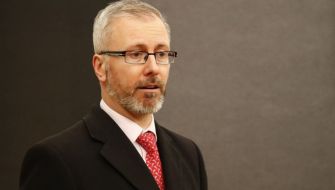The current rise in Covid cases was anticipated by health officials and renewed advice on mask-wearing should have been issued before this week, according to a virologist.
A rise in cases and hospital numbers this week has led to people being encouraged to wear masks again.
Dr Colm Henry, the HSE's chief clinical officer, said there had been a sharp increase in cases and hospitalisations in recent weeks which may be due to emerging variants of the virus.
Dr Gerald Barry, a UCD virologist, told BreakingNews.ie that he believes there should be more focus on attempts to reduce the spread of Covid in the population.
Dr Barry said the hospital numbers were a "microcosm" of what is happening in the population as cases rise.
Communication
He said better communication to the public could help with future waves, and questioned why people were not warned about the current increase as data was available five or six weeks ago.
Simple advice like resuming mask-wearing in crowded spaces, and regularly antigen testing, should have been made before this week, according to Dr Barry.
"It frustrates me that these conversations aren’t going on at a senior political level, or at least don’t appear to be," he said.
"On a Government/Department of Health/HSE level there doesn’t seem to be much else going on in terms of trying to stop people getting infected.
"Having the virus bouncing around off walls of immunity can lead to trouble down the line."
He cited the State exams as an example, adding that parents and students could have benefited from being informed of a potential wave of infection.
Dr Barry said the Department of Health and the body which has replaced the National Public Health Emergency Team (Nphet), the Covid-19 Advisory Group, should focus on improving communication along with other measures to mitigate the spread of Covid-19 in the population.
He said this would be even more important ahead of the likely winter wave of the virus.
However, he added that the current spread of cases show that Covid will not necessarily become a seasonal virus like some have predicted.
Waves of infection
"If we called our lockdowns to protect the hospital system, then having huge waves of infection like we had in the winter of this year didn’t result in our hospital system collapsing, therefore we can kind of manage any wave of infection as long as our vaccination stands up to it and doesn’t result in major waves of severe illness.
"I kind of look at that and think if you make all your decisions based on hospital numbers and severe illness, then we can kind of continue as we’re going on and live with the fact that we see massive waves of infection every three to six months.
"If you take another point of view, and say, 'actually having big waves of infection, even if they don’t result in our hospital system collapsing, probably isn’t a good thing'. In the sense of, if you think about your life most people could count on one hand the times they were very sick, people may have had a bad cold, the odd flu that made them sick for a few days, probably once or twice in their life for most people.
"When you convert that into feeling rubbish for a week every six months, or feeling rubbish for a week every three months potentially, depending on what waves we see over the next few years, that’s not exactly a very nice situation to imagine."
He also said long-term health risks of continued Covid waves, and the impact of long Covid, should be taken into account.
Long Covid
"You also have to wonder about the long-term impact on the body when that’s happening, we don’t really know the long-term impact of multiple infections with Covid, we don’t really know the long-term impact of long Covid, we don’t know the impact on the general health of the population in having multiple waves of infection with the same virus over and over again.
"It could be that our bodies will just become so used to it... that the impact will lessen, or it could be that in a certain proportion of the population we see long Covid impacts where you have long-term fatigue, there is clear evidence in certain cohorts of the population that there are neurological impacts, cardiac impacts, there are increases in all sorts of issues."
He added: "I think that’s where we’re failing, we’re saying 'we have the vaccine we don’t have to try to mitigate or reduce because the vaccine will protect our hospitals.... and that’s all that matters'.
"I’d be more inclined to say we need to double our efforts to reduce infection without putting restrictions on the population. What can we do in society that would help to reduce these waves of infection? We can’t stop them... but to reduce the peak, to limit the infection in the population without having to introduce restrictions.
"That’s things like communicating with the public better, telling them there will be a wave in two or three weeks' time, so now is the time to start wearing masks again... or now is the time to start using antigen tests more regularly."
He said ventilation was another area with work to be done, adding that inspections of restaurants and bars could be amended to include ventilation tests.
Mr Barry said full lockdowns in the future were unlikely, unless a new variant which is completely resistant to immunity emerges. However, he thinks it is likely that all cohorts will be asked to take a second booster vaccine.
"Having said that you can never predict what will come out of left field with this virus, but if we continue on the trajectory we’re on where we’re seeing variants of Omicron or one of the previous versions that have a similarity to what we’ve been dealing with, then it’s likely the vaccine will continue to give very good protection.
"I think another booster is likely to be recommended for everyone coming into the winter or autumn. It would boost the immunity in the population and help to keep a lid on any wave that will come in the winter and would help keep people out of hospital.
"That may well be the same vaccines we’ve got, or if regulation and production increase in time it may well be a slightly modified version of the vaccine that’s more specific to variants, it may not come in time for the winter, but it may come early next year.
"In the next three to six months I’d imagine everyone will be offered another shot of what we’ve had already, just to boost immunity again and help us get through the winter where we’re probably going to see a surge in infections again.
"The important thing is the virus is continuing to change, and it will try to avoid whatever barrier we put in front of it. At the moment we’re putting up a big wall of immunity based on our vaccination rates, and it’s possible for the virus to get around that, but the important thing is we have multiple layers of immunity in our bodies. Those secondary and tertiary levels of immunity will continue to work well even if the virus changes further."







